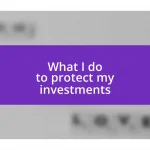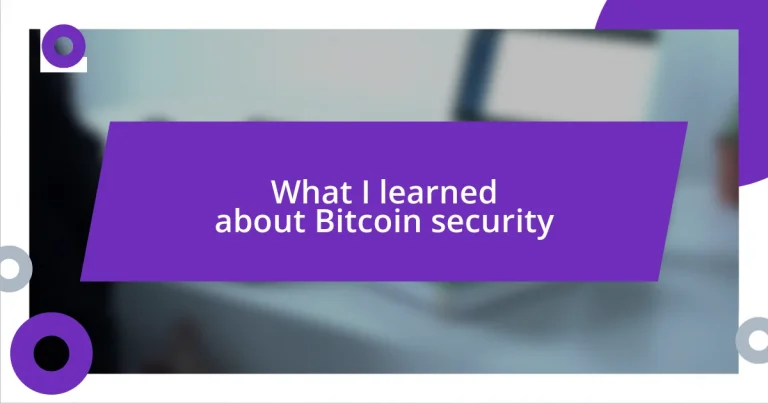Key takeaways:
- Understanding Bitcoin security involves recognizing risks like phishing attacks, lost private keys, and the importance of strong passwords to prevent significant financial loss.
- Utilizing hardware wallets greatly enhances security by storing private keys offline and protecting against malware and hacking attempts.
- Implementing two-factor authentication and regularly updating software are crucial practices that provide additional layers of security for Bitcoin investments.
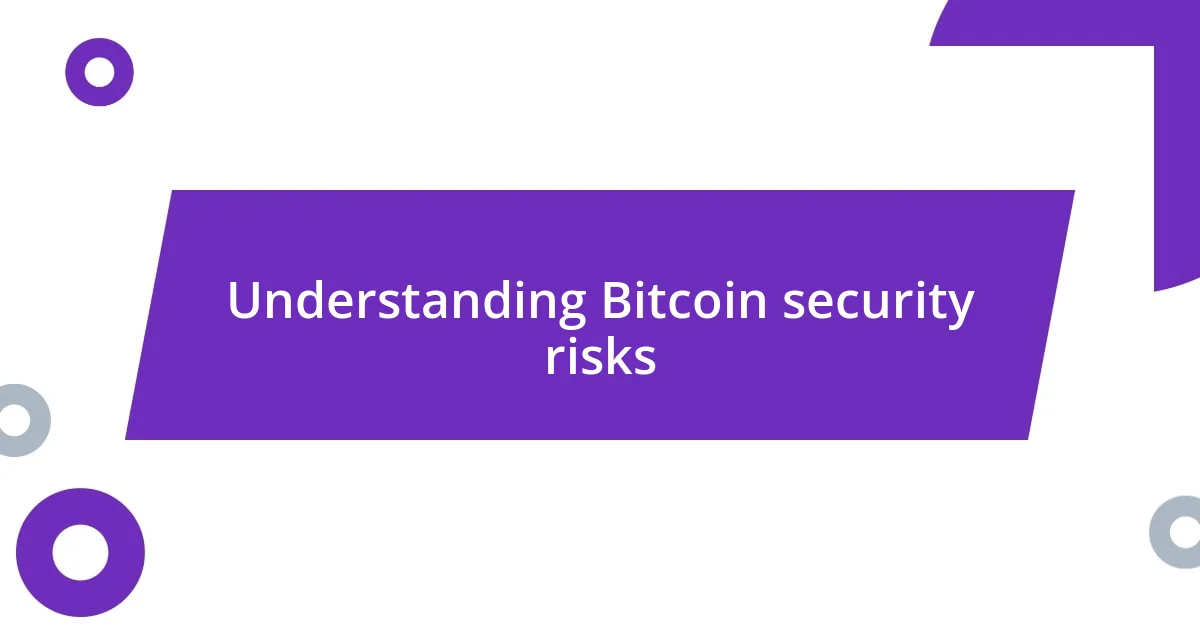
Understanding Bitcoin security risks
When it comes to Bitcoin security risks, I often recall the early days of my own cryptocurrency journey. I remember the nagging feeling in my gut after hearing about a major exchange hack that left countless individuals, including some of my friends, scrambling to recover lost funds. It’s a stark reminder that while the allure of Bitcoin is undeniable, the environment is fraught with vulnerabilities that can catch even the most cautious users off guard.
Phishing attacks are another risk I’ve encountered firsthand; they can be incredibly deceptive. I once received an official-looking email claiming to be from my wallet provider and almost clicked the link. That moment of hesitation made me realize how easy it is to be lulled into a false sense of security. Have you ever felt that rush of anxiety when you think you’ve made a mistake online? It’s crucial to remain vigilant, as cybercriminals are constantly refining their tactics.
Moreover, the concept of lost private keys is something every Bitcoin user should grapple with. I know someone who misplaced their keys and lost a significant amount of Bitcoin forever. This not only highlights the importance of securely storing these keys but also serves as a poignant reminder of the accountability we have in managing our digital assets. How would you feel about losing a financial opportunity you once had at your fingertips? That feeling of helplessness can be overwhelming, making it imperative to understand and mitigate these risks effectively.
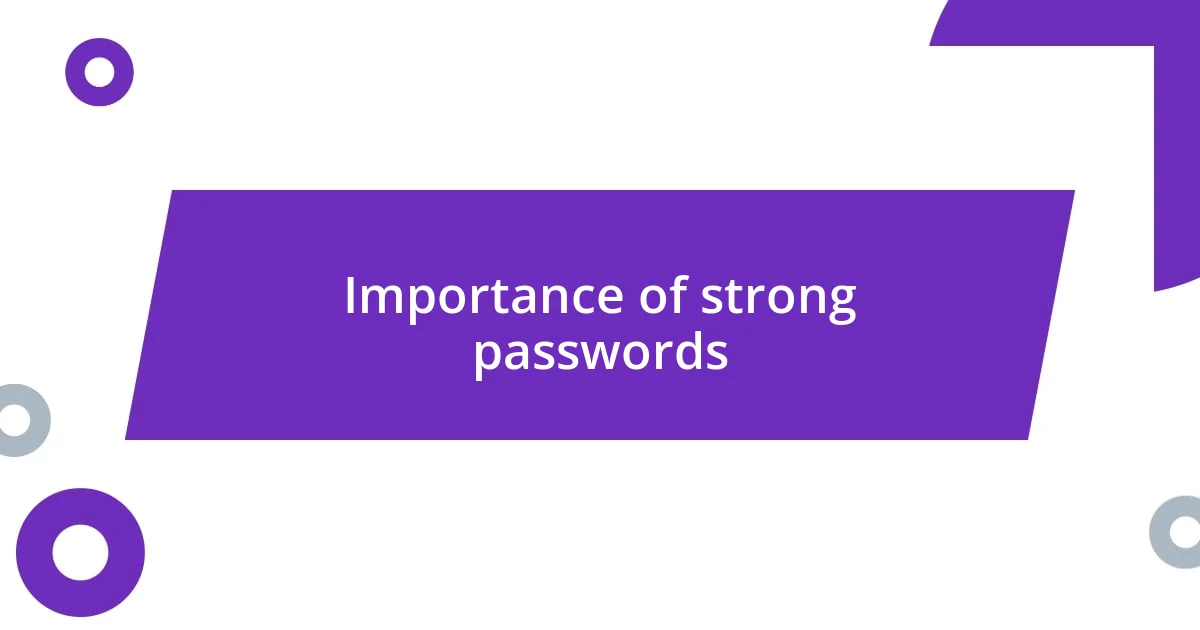
Importance of strong passwords
One of the fundamental lessons I’ve learned about Bitcoin security is the undeniable importance of strong passwords. I used to think that a simple mix of letters and numbers would suffice, but then I faced a moment that shook my sense of security. I had been using the same password for multiple accounts, and when I finally took a hard look at my security practices, I realized I was just one data breach away from disaster. It’s a wake-up call that can happen to anyone; passwords should be unique and complex to be effective defenses against hackers.
Here are some key characteristics to consider when creating strong passwords:
- Length Matters: Aim for at least 12-16 characters.
- Complexity: Include a mix of upper and lower-case letters, numbers, and symbols.
- Avoid Personal Information: Don’t use birthdays or names that can be easily guessed.
- Use Passphrases: Consider creating a memorable phrase that combines multiple unrelated words.
- Password Managers: Tools like these can help you generate and store complex passwords securely.
Each of these strategies contributes to a fortified defense against potential breaches. I think about my digital assets every day, and I can’t help but feel a sense of pride and security when I know my passwords are doing their job. After implementing these practices, I felt a weight lift off my shoulders, knowing I was taking my security seriously.
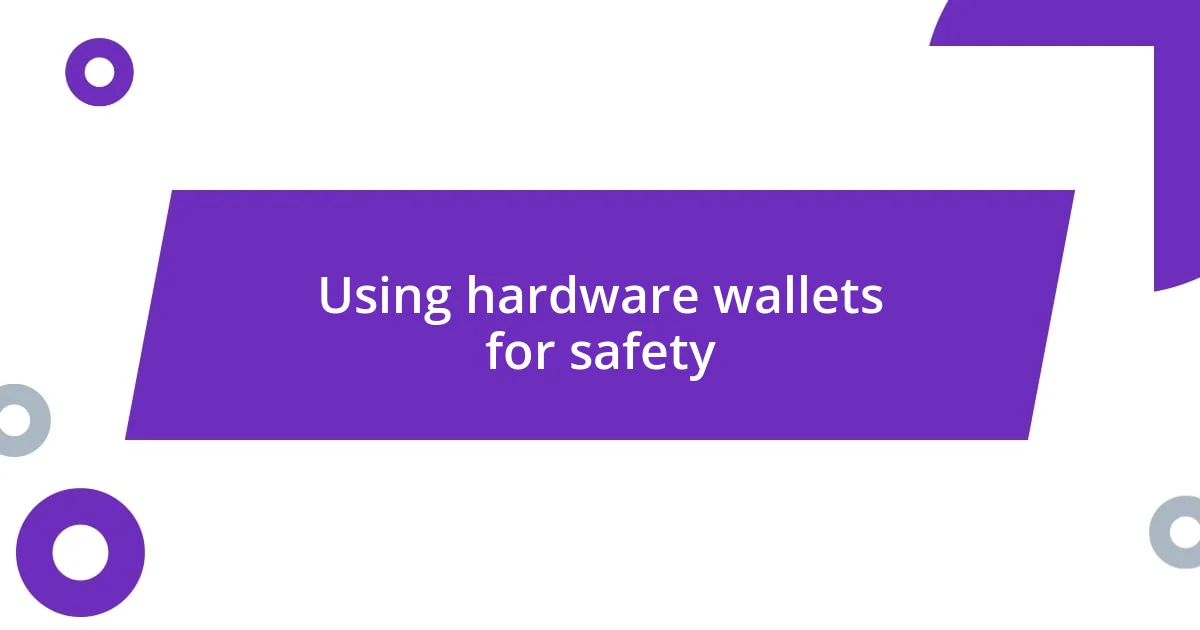
Using hardware wallets for safety
Using a hardware wallet has significantly transformed my approach to Bitcoin security. When I first got into cryptocurrency, I relied solely on software wallets, which felt convenient—until I learned about their vulnerabilities. Transitioning to a hardware wallet was like upgrading from a flimsy lock to a high-security vault. I still remember the relief I felt when I realized that my private keys were stored offline, making them far less susceptible to hacking attempts. Have you ever experienced that sense of peace knowing your valuables are well-guarded? It’s liberating.
One of the standout features of hardware wallets is their resistance to malware attacks. I recall a time when my computer got infected with a virus, and while I panicked about potential data loss, my hardware wallet remained unscathed. This is because hardware wallets create a secure environment for transactions, allowing me to interact with my Bitcoin safely even in unpredictable situations. Trust me; the peace of mind that comes with this security is hard to overstate.
Moreover, I appreciate the simplicity of using hardware wallets for daily transactions. Initially, setting it up seemed daunting, but the user-friendly interfaces made the process surprisingly straightforward. Every time I connect my hardware wallet, I feel a rush of confidence. I know my assets are not only secure but also manageable. Isn’t it reassuring to think that with just a few clicks, I can protect my finances while still enjoying the benefits of cryptocurrency?
| Feature | Hardware Wallet |
|---|---|
| Private Key Storage | Offline, reducing hacking risks |
| Transaction Environment | Secure, minimizing malware exposure |
| Ease of Use | User-friendly interface for transactions |
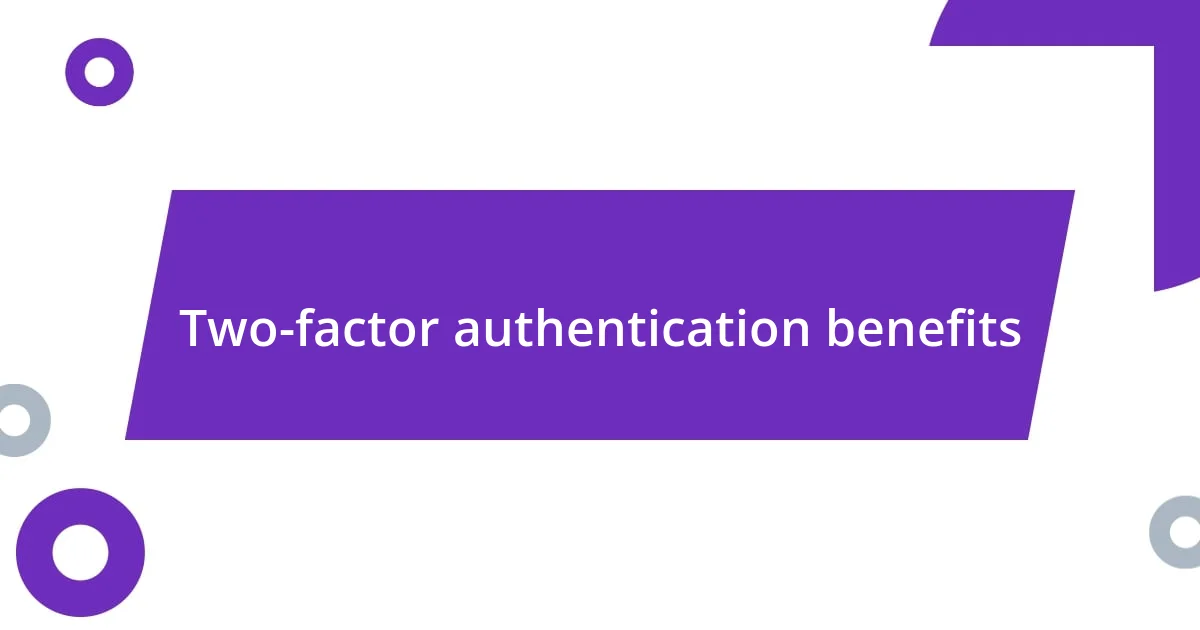
Two-factor authentication benefits
Two-factor authentication (2FA) has become a cornerstone of my strategy for securing my Bitcoin investments. I remember the first time I set it up; the initial friction felt like a hassle, but once I saw the benefits, I was truly grateful. With 2FA, I realized that even if a hacker somehow got hold of my password, they’d still need that additional code, which is often sent to my phone. Have you ever experienced that surge of relief knowing there’s an extra layer protecting your assets? It’s empowering.
Another benefit of 2FA is that it forces me to engage with my security practices actively. Each time I log in, I pause to enter that second piece of information, which prompts me to think about my overall security. It’s a small moment, but it reinforces the idea that taking those extra seconds for verification isn’t just a chore—it’s a necessary step in safeguarding what I’ve worked hard for. This brief interaction has fundamentally changed how I perceive my online safety.
What’s particularly rewarding is the added peace of mind it brings, especially in the volatile world of cryptocurrencies. I vividly remember a close call with an attempted unauthorized access on one of my accounts. Thanks to 2FA, the would-be intruder was immediately denied access. My heart raced as I realized how easily it could have gone the other way if I hadn’t enabled that feature. It illustrates perfectly how even a minor adjustment in security habits can lead to significant protection against potential threats. Don’t you think that’s worth it?
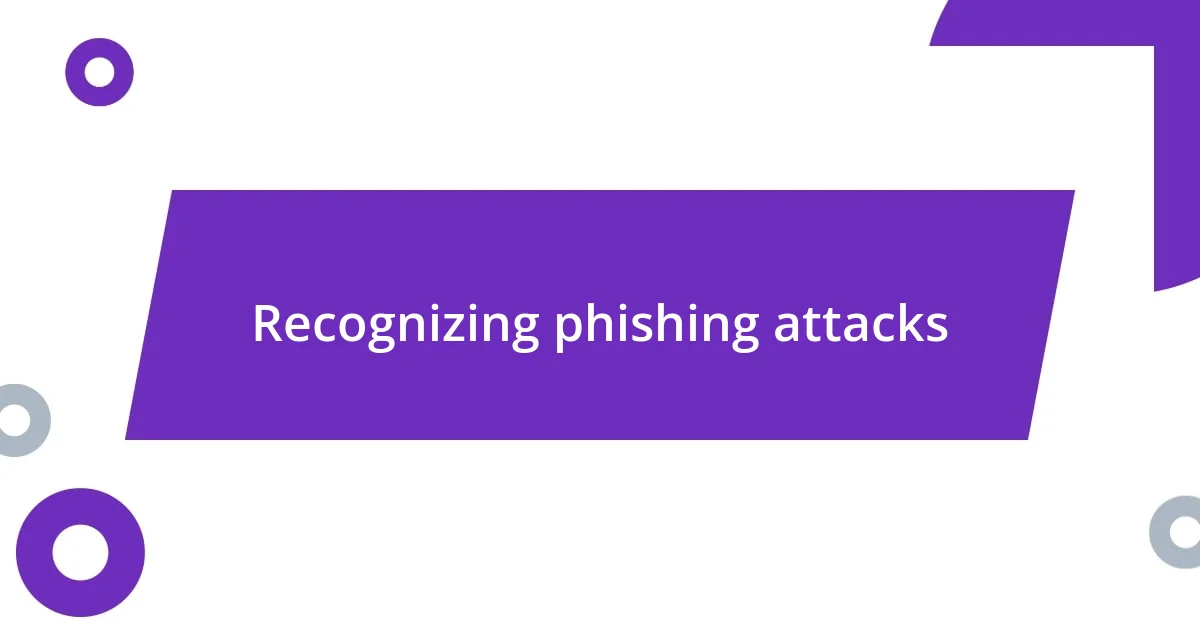
Recognizing phishing attacks
Recognizing phishing attacks is crucial in maintaining the security of Bitcoin and other digital assets. I vividly recall the first phishing attempt I nearly fell victim to; it involved an email that looked almost identical to one from my exchange. The urgency in the message caught me off guard, urging me to click a link to verify my account. Luckily, something felt off—an instinct I often rely on—and I took the time to examine the email address closely. Have you ever paused and felt that nagging doubt when something seems too urgent? Trust that feeling; it can often protect you from significant risks.
Phishing attacks can take various forms, from deceptive emails to fake websites designed to impersonate legitimate services. One time, I received a directed message on social media claiming I’d won cryptocurrency in a giveaway. It was enticing, but my gut told me to investigate further. Upon researching, I discovered it was a ploy to harvest personal information. I’ve learned that legitimate companies rarely engage in such tactics, a key indicator to help spot potential scams. It’s amazing how much safer I feel now just by being mindful of these red flags.
It’s essential to stay vigilant and educate ourselves about the evolving tactics used by cybercriminals. I make it a habit to double-check URLs and look for the small padlock icon in the address bar, which signifies a secure site. This practice has reduced my anxiety around online transactions immensely. Engaging in continuous learning about phishing attacks empowers us to navigate the digital landscape confidently. How do you ensure your own safety against these kinds of threats?
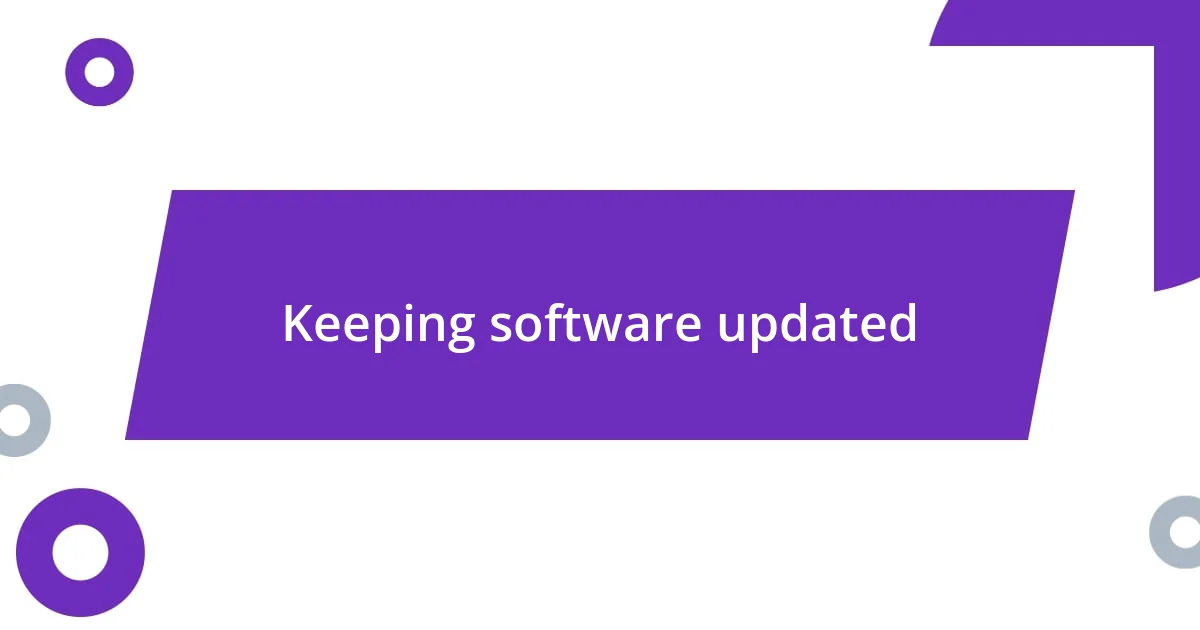
Keeping software updated
Keeping software updated is one of the simplest yet most effective ways to enhance your Bitcoin security. I recall a time when I neglected to update my wallet software for a few months because I thought the process was trivial. Then, I learned about a security patch that fixed vulnerabilities exploited by hackers. It was a wake-up call that underscored how crucial those updates are; they often contain fixes for known issues that could leave your assets exposed. Have you ever dismissed an update notification, only to regret it later?
I’ve made it a point now to schedule regular updates for my Bitcoin software. Initially, I didn’t grasp the urgency, but after reading about breaches that could have been prevented with timely updates, I realized the error of my ways. Each time I see that little update reminder pop up, I feel a mix of responsibility and empowerment—knowing that I’m proactively protecting my investments. It’s more than just hitting “install”; it’s about asserting control over my financial security.
Moreover, I’ve seen countless stories where individuals lost significant amounts of Bitcoin simply because they overlooked an update. I can almost feel their frustration; imagine watching your hard-earned crypto disappear because your software was outdated. It’s a heart-wrenching tale that I want to avoid at all costs. Artificial intelligence and evolving malware are relentless, so I ask myself: can I really afford to ignore those updates? The answer is a resounding no. Keeping my software current isn’t just a good habit; it’s essential for safeguarding my future.
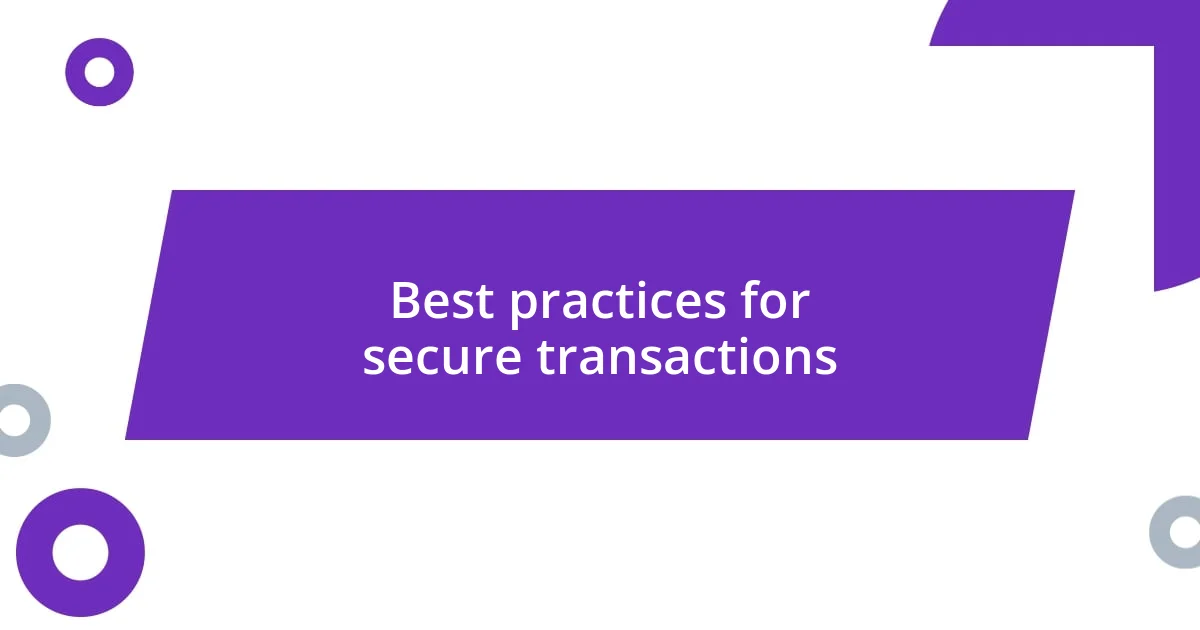
Best practices for secure transactions
When conducting transactions, keeping your private keys secure is vital. I remember the sinking feeling I had after realizing I had stored mine in an unencrypted format on my computer. It was a lesson I won’t soon forget. Now, I always use a hardware wallet to ensure my keys are stored safely, away from prying eyes and potential malware. Have you ever thought about where you keep your private keys? That choice can make or break your security.
Another significant practice I follow is to verify transaction details thoroughly before hitting send. I once made a mistake when trying to send Bitcoin to a friend; I misread the address and almost sent funds to the wrong person. Fortunately, I double-checked and caught my error just in time. That moment taught me to slow down and confirm all information, because in this space, a single character can lead to heartache. It’s such a simple step, yet it can save you from potentially devastating loss.
Setting up two-factor authentication (2FA) adds another robust layer of security. Initially, I was hesitant to use it; the idea of juggling an extra step seemed tedious. But after hearing from individuals who had their accounts compromised, I quickly changed my tune. Now, I rely on authentication apps and always feel a surge of confidence knowing that my transactions aren’t just protected by a password. What’s stopping you from embracing 2FA? Trust me—it’s a game changer for your Bitcoin security!








